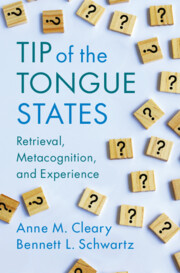Book contents
- Tip of the Tongue States
- Tip of the Tongue States
- Copyright page
- Contents
- Figures and Table
- Preface
- Chapter 1 Introduction and History of Research on Tip-of-the-Tongue States
- Chapter 2 Methodology
- Chapter 3 Tip-of-the-Tongue States in the Lab and in the World
- Chapter 4 Tip-of-the-Tongue State Etiology
- Chapter 5 Phenomenology
- Chapter 6 Flipping the Script
- Chapter 7 It’s Not All Bad
- Chapter 8 Tip-of-the-Tongue States Early and Late in Life
- Chapter 9 Toward an Understanding of the Neural Basis of the Tip-of-the-Tongue Experience
- Chapter 10 Related Phenomena
- Chapter 11 Tying It All Together
- References
- Author Index
- Subject Index
Chapter 2 - Methodology
How Researchers Study the Tip-of-the-Tongue State
Published online by Cambridge University Press: 26 May 2025
- Tip of the Tongue States
- Tip of the Tongue States
- Copyright page
- Contents
- Figures and Table
- Preface
- Chapter 1 Introduction and History of Research on Tip-of-the-Tongue States
- Chapter 2 Methodology
- Chapter 3 Tip-of-the-Tongue States in the Lab and in the World
- Chapter 4 Tip-of-the-Tongue State Etiology
- Chapter 5 Phenomenology
- Chapter 6 Flipping the Script
- Chapter 7 It’s Not All Bad
- Chapter 8 Tip-of-the-Tongue States Early and Late in Life
- Chapter 9 Toward an Understanding of the Neural Basis of the Tip-of-the-Tongue Experience
- Chapter 10 Related Phenomena
- Chapter 11 Tying It All Together
- References
- Author Index
- Subject Index
Summary
TOTs are inherently subjective experiences; only the experiencer can really know whether one is happening and what it feels like as it does. As such, methodologies and their nuances are extremely important. This chapter covers the various methods that have been employed to measure TOTs. The prospecting method – now the most widely used method of studying TOTs – was first developed by Brown and McNeill (1966) in their seminal paper. Present-day use of the method commonly employs word definitions, general-information questions, or faces of famous people. The method can also be adapted to new learning. It is also important to determine how accurate TOTs are at predicting later memory, and we discuss approaches to doing so. Another approach to studying TOTs involves diary studies, in which people are asked to record their naturally occurring TOTs and their qualities and characteristics over a set period of time. How TOT rates should be computed remains an important issue. Depending on one's theoretical approach, it can make sense to divide the number of TOTs over all unrecalled items, or it may be better to divide the number of TOTs over TOTs plus correctly recalled items.
Information
- Type
- Chapter
- Information
- Tip of the Tongue StatesRetrieval, Metacognition, and Experience, pp. 19 - 48Publisher: Cambridge University PressPrint publication year: 2025
